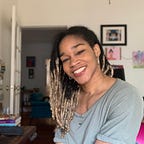The garbage pseudoscience of Pinterest
The problem with laymen’s science is that not everyone has the digital literacy chops to find the information they need outside of social media, and the problem I have with that is that social media can be fucking toxic: it’s “news you can use” science, cute experiments for toddlers, and huge, steaming piles of misinformation.
Some might argue that more information won’t fix anything — that the average American couldn’t fathom half the material contained in a journal for experts in neuroscience or machine learning, and they’re right…kind of. I mean, we’re already wading through at least 15 hours of media a day. We’re drowning in data, forced to skim and merely dip our toes into the massive lake of information we already have at our disposal, and we still disseminate memes that agree with outdated popular opinion instead of what is actually true.
Yes, we do have too much info. But we also have the wrong kinds.
I may not have access to scholarly articles, for example, but what I do have is Pinterest, which commonly serves pseudoscience of all kinds with no citations to speak of. Not to mention we’re all too eager today to seek out information that confirms our biases, and self-diagnose based on our own loose understanding of tiny slivers of third-party knowledge journalists parse from expert research we don’t have access to. Opening the floodgates to specialized knowledge might exacerbate this.
That’s why I’m not asking for the floodgates to be flung open; only the doors. Magazines like Popular Science inform laymen like myself of scientific topics that have been under meticulous study for decades. Give us a TL;DR version longer than the abstract. Keep the details, but give us the facts.
It terrifies me to consider the idea of fighting fire with fire; rectifying our piles of scientific misinformation with bigger, louder social media campaigns trumpeting reputable sources. That’s an epidemic of digital fatigue waiting to happen. We’re in too deep to begin with.
There’s plenty of research on the movement of democratizing information in all spaces. It’s exciting to see how far we’ve taken this: Aaron Tay talks about the possibility of using services like Open Access Button in lieu of subscribing to journals and services in academic libraries. Wikimedia keeps the lights on for Wikipedia, where volunteers collect sources and distill “the sum of all knowledge” into more than 200 languages around the world.
But Wikipedia isn’t perfect, and volunteer editors can’t write articles on topics for which they have no access to information. Without high-quality articles written by experts in a field, a layman’s research can easily lead them to speculative sources that, to be frank, haven’t a goddamn clue what they’re talking about.
I hope that letting laymen in on research will allow us to be better informed, and to let scientists off the hook a little bit. Sometimes science gets it wrong. (James Heathers has some great words on detractors of open science.) There are people who believe that just because one doctor misdiagnosed a cold, all doctors must be irrelevant know-nothings feeding us medical lies while riding their high horse into the six-figure horizon.
Letting us in on the game also allows us to participate on scientists’ terms, like in citizen science projects that allow us to explore and guide our own discovery. The “people as products” business model tech giants have taught us to fear and despise can be ethically adapted in science, giving laymen opportunities to collect data that directly affects ongoing scientific studies, then presenting in non-sciencey terms the conclusions we’ve helped them arrive at. Instead of relying solely on articles we’re not reading and doctors we’re not visiting, give us a chance to get hands-on.
I’m excited to see this model in action, so if you know of a project where this is already happening, please share it!
Reading list:
- Cooper, Caren. Citizen Science: How Ordinary People Are Changing the Face of Discovery. The Overlook Press, 2016.
- Nichols, Thomas M. The Death of Expertise: The Campaign Against Established Knowledge and Why It Matters. Oxford University Press, 2017.
